- My Forums
- Tiger Rant
- LSU Recruiting
- SEC Rant
- Saints Talk
- Pelicans Talk
- More Sports Board
- Fantasy Sports
- Golf Board
- Soccer Board
- O-T Lounge
- Tech Board
- Home/Garden Board
- Outdoor Board
- Health/Fitness Board
- Movie/TV Board
- Book Board
- Music Board
- Political Talk
- Money Talk
- Fark Board
- Gaming Board
- Travel Board
- Food/Drink Board
- Ticket Exchange
- TD Help Board
Customize My Forums- View All Forums
- Show Left Links
- Topic Sort Options
- Trending Topics
- Recent Topics
- Active Topics
Started By
Message
OTD in 1861: First Manassas
Posted on 7/21/19 at 9:37 am
Posted on 7/21/19 at 9:37 am
LINK
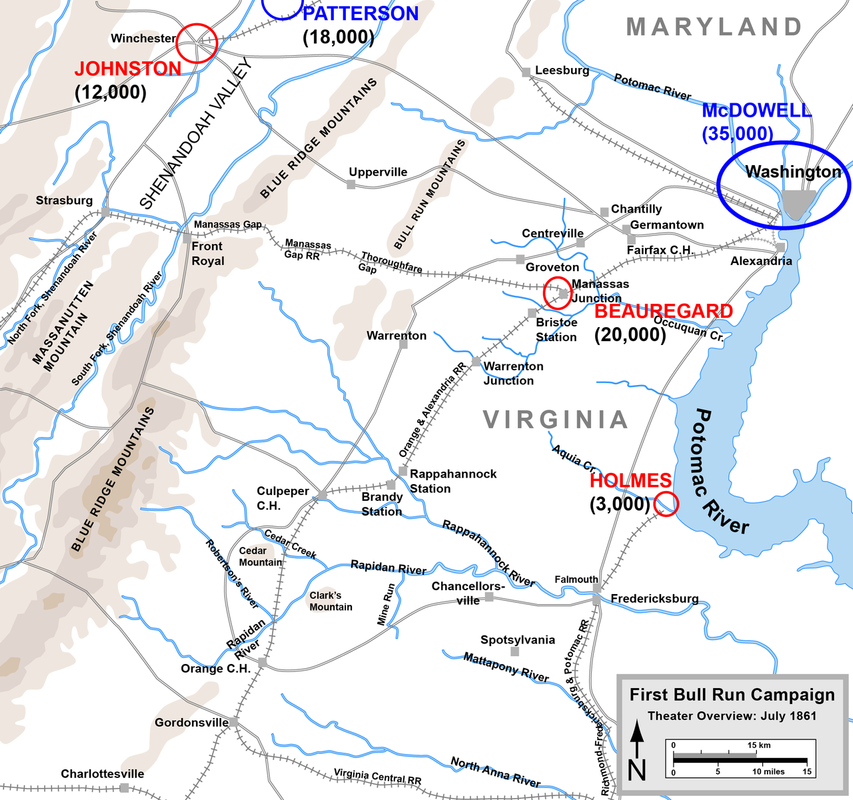
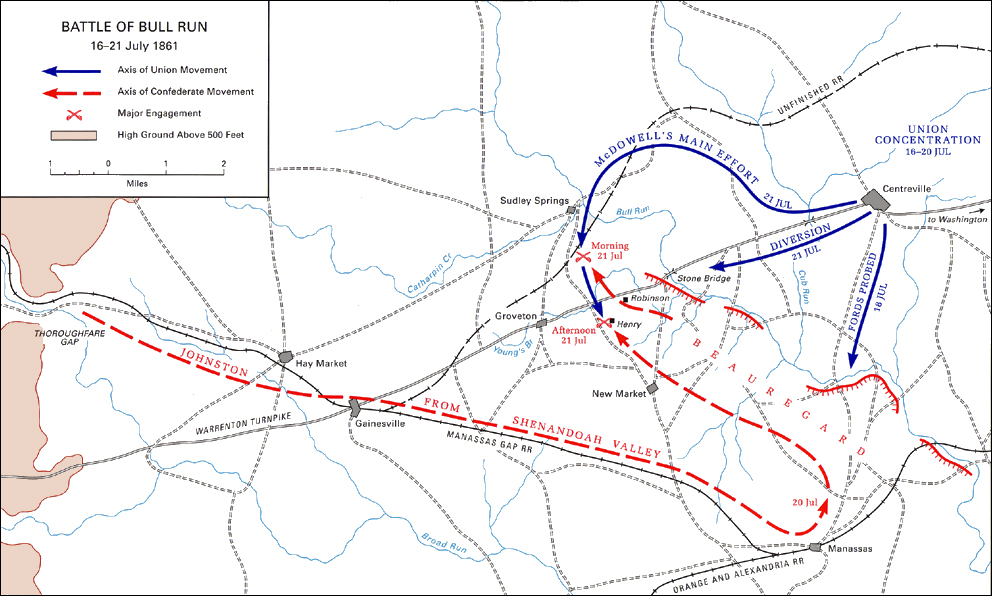
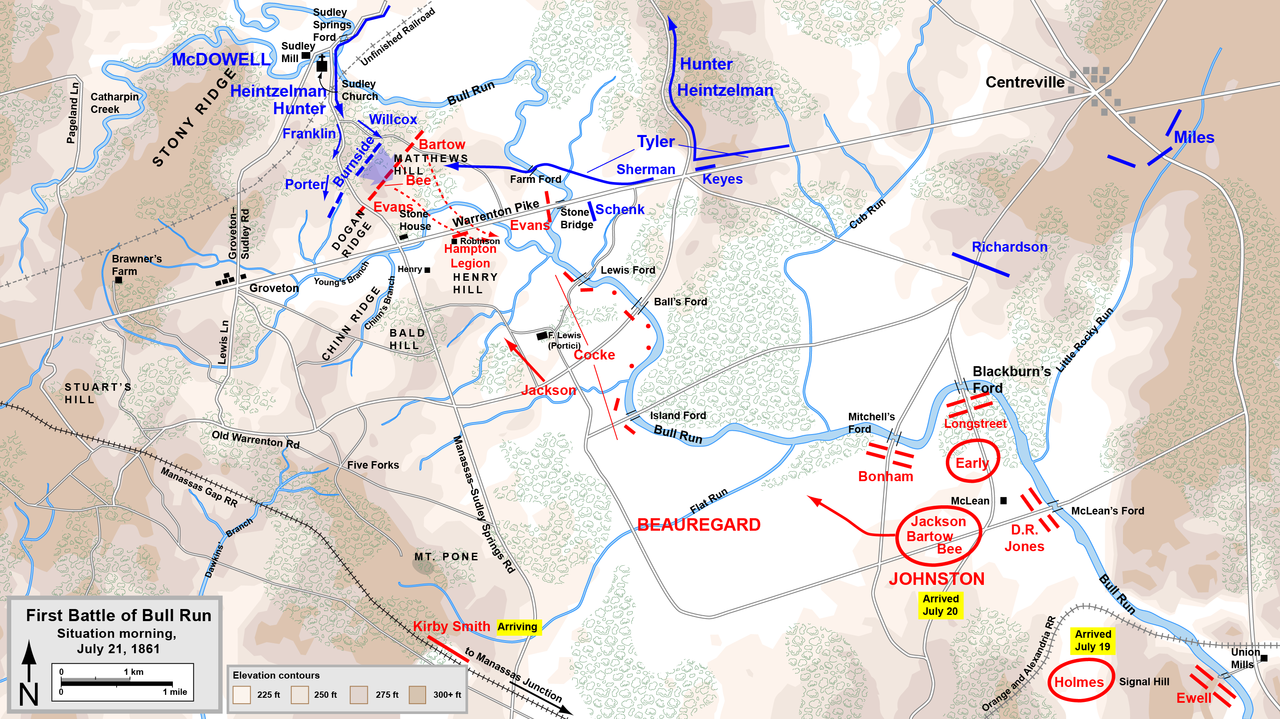
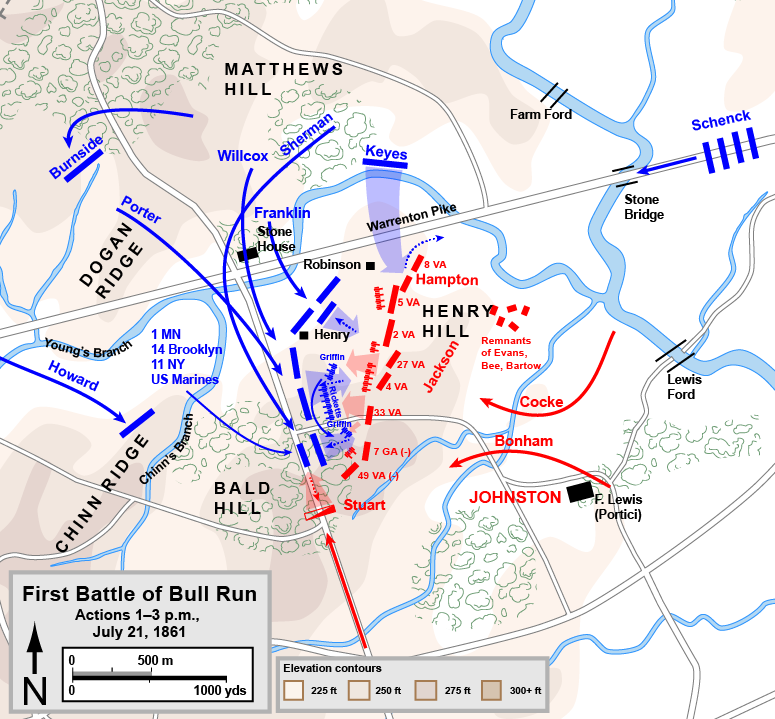
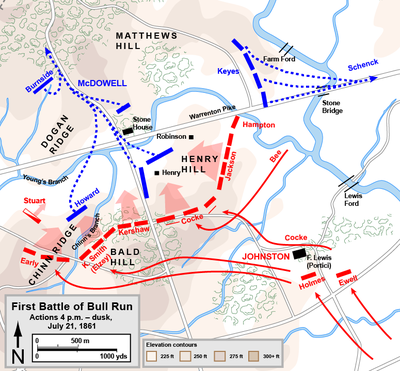
quote:
On July 21, 1861, Union and Confederate armies clashed near Manassas Junction, Virginia, in the first major land battle of the American Civil War. Known as the First Battle of Bull Run (or Manassas), the engagement began when about 35,000 Union troops marched from the federal capital in Washington, D.C. to strike a Confederate force of 20,000 along a small river known as Bull Run. After fighting on the defensive for most of the day, the rebels rallied and were able to break the Union right flank, sending the Federals into a chaotic retreat towards Washington. The Confederate victory gave the South a surge of confidence and shocked many in the North, who realized the war would not be won as easily as they had hoped.

quote:
By July 1861, two months after Confederate troops opened fire on Fort Sumter to begin the Civil War, the northern press and public were eager for the Union Army to make an advance on Richmond ahead of the planned meeting of the Confederate Congress there on July 20. Encouraged by early victories by Union troops in western Virginia, and by the war fever spreading through the North, President Abraham Lincoln ordered Brigadier General Irvin McDowell to mount an offensive that would hit quickly and decisively at the enemy and open the way to Richmond, thus bringing the war to a mercifully quick end. The offensive would begin with an attack on more than 20,000 Confederate troops under the command of General P.G.T. Beauregard camped near Manassas Junction, Virginia (25 miles from Washington, D.C.) along a little river known as Bull Run.
quote:
The cautious McDowell, then in command of the 35,000 Union volunteer troops gathered in the Federal capital, knew that his men were ill prepared and pushed for a postponement of the advance to give him time for additional training. But Lincoln ordered him to begin the offensive nonetheless, reasoning (correctly) that the rebel army was made up of similarly amateur soldiers. McDowell’s army began moving out of Washington on July 16; its slow movement allowed Beauregard (who also received advance notice of his enemy’s movements through a Confederate espionage network in Washington) to call on his fellow Confederate General Joseph E. Johnston for reinforcements. Johnston, in command of some 11,000 rebels in the Shenandoah Valley, was able to outmaneuver a Union force in the region and march his men towards Manassas.

quote:
McDowell’s Union force struck on July 21, shelling the enemy across Bull Run while more troops crossed the river at Sudley Ford in an attempt to hit the Confederate left flank. Over two hours, 10,000 Federals gradually pushed back 4,500 rebels across the Warrington turnpike and up Henry House Hill. Reporters, congressmen and other onlookers who had traveled from Washington and were watching the battle from the nearby countryside prematurely celebrated a Union victory, but reinforcements from both Johnston and Beauregard’s armies soon arrived on the battlefield to rally the Confederate troops. In the afternoon, both sides traded attacks and counterattacks near Henry House Hill. On Johnston and Beauregard’s orders, more and more Confederate reinforcements arrived, even as the Federals struggled with coordinating assaults made by different regiments.


quote:
By four o’clock in the afternoon, both sides had an equal number of men on the field of battle (about 18,000 on each side were engaged at Bull Run), and Beauregard ordered a counterattack along the entire line. Screaming as they advanced (the “rebel yell” that would become infamous among Union troops) the Confederates managed to break the Union line. As McDowell’s Federals retreated chaotically across Bull Run, they ran headlong into hundreds of Washington civilians who had been watching the battle while picnicking on the fields east of the river, now making their own hasty retreat.

quote:
Among the future leaders on both sides who fought at First Manassas were Ambrose E. Burnside and William T. Sherman (for the Union) along with Confederates like Stuart, Wade Hampton, and most famously, Thomas J. Jackson, who earned his enduring nickname, “Stonewall,” in the battle. Jackson, a former professor at the Virginia Military Institute, led a Virginia brigade from the Shenandoah Valley into the battle at a key moment, helping the Confederates hold an important high-ground position at Henry House Hill. General Barnard Bee (who was later killed in the battle) told his men to take heart, and to look at Jackson standing there “like a stone wall.”
quote:
Despite their victory, Confederate troops were far too disorganized to press their advantage and pursue the retreating Yankees, who reached Washington by July 22. The First Battle of Bull Run (called First Manassas in the South) cost some 3,000 Union casualties, compared with 1,750 for the Confederates. Its outcome sent northerners who had expected a quick, decisive victory reeling, and gave rejoicing southerners a false hope that they themselves could pull off a swift victory. In fact, both sides would soon have to face the reality of a long, grueling conflict that would take an unimaginable toll on the country and its people.
quote:
On the Confederate side, accusations flew between Johnston, Beauregard and President Jefferson Davis over who was to blame for the failure to pursue and crush the enemy after the battle. For the Union, Lincoln removed McDowell from command and replaced him with George B. McClellan, who would retrain and reorganize Union troops defending Washington into a disciplined fighting force, thereafter known as the Army of the Potomac.
This post was edited on 7/21/19 at 9:54 am
Posted on 7/21/19 at 9:42 am to TigerFanInSouthland
If the present-day UK Foreign Office had been in the place of the US Federal Government, it would have responded to the Rebel attack by issuing a statement terming it “highly regrettable”.
This post was edited on 7/21/19 at 9:44 am
Posted on 7/21/19 at 9:43 am to TigerFanInSouthland
Thank you for using the correct name.
Those high skirt lady boys from the union went scattering back to Washington. We should have pressed our initiative and followed them.
Those high skirt lady boys from the union went scattering back to Washington. We should have pressed our initiative and followed them.
Posted on 7/21/19 at 9:56 am to The Boat
quote:
Thank you for using the correct name.
quote:
Those high skirt lady boys from the union went scattering back to Washington.
They sent those poofters running
This post was edited on 7/21/19 at 9:57 am
Posted on 7/21/19 at 11:52 am to TigerFanInSouthland
For whatever reason one of my favorite battle images as a kid...


Posted on 7/21/19 at 2:38 pm to TigerFanInSouthland
too bad the yankees eventually found better generals
Posted on 7/21/19 at 2:40 pm to TigerFanInSouthland
Talk about a brutal wake-up call.
Both sides thought the war should be short, relatively bloodless, and decided in one major battle. While many of the professional soldiers leftover from the Mexican War knew what was in store, very few of your average Americans actually had an idea of what was about to transpire.
The First Battle of Manassas was an end to innocence. It was the bloodiest battle ever fought by the United States up to that point in time, with more than 4,800 combined casualties. That's a drop in the bucket compared to what was about to come at battlefields such as Shiloh, Antietam, and Gettysburg, but it was most definitely jarring to a public who expected a quick and bloodless fight.
Both sides thought the war should be short, relatively bloodless, and decided in one major battle. While many of the professional soldiers leftover from the Mexican War knew what was in store, very few of your average Americans actually had an idea of what was about to transpire.
The First Battle of Manassas was an end to innocence. It was the bloodiest battle ever fought by the United States up to that point in time, with more than 4,800 combined casualties. That's a drop in the bucket compared to what was about to come at battlefields such as Shiloh, Antietam, and Gettysburg, but it was most definitely jarring to a public who expected a quick and bloodless fight.
Posted on 7/21/19 at 2:49 pm to TigerFanInSouthland
quote:
On the Confederate side, accusations flew between Johnston, Beauregard and President Jefferson Davis over who was to blame for the failure to pursue and crush the enemy after the battle.
I had read that by crushing McDowells force and occupying Washington DC, the CSA could have gained the foreign support needed for it's independence, if not earning it out-right.
Posted on 7/21/19 at 2:56 pm to keks tadpole
quote:
I had read that by crushing McDowells force and occupying Washington DC, the CSA could have gained the foreign support needed for it's independence, if not earning it out-right.
very likely, but they were tired and somewhat disorganized, so they left that opportunity for another day, that day never came again with such clarity.
Posted on 7/21/19 at 4:33 pm to keks tadpole
quote:
I had read that by crushing McDowells force and occupying Washington DC, the CSA could have gained the foreign support needed for it's independence, if not earning it out-right.
That’s one of two major what ifs in the war.
What if the CSA kept up the pressure after Manassas and what if they take Cemetery Ridge at Gettysburg before the Union does?
Posted on 7/21/19 at 5:15 pm to TigerFanInSouthland
And that, South, is why you play all 4 Quarters. A touchdown on the first play don’t guarantee nuthin
Popular
Back to top
 6
6








